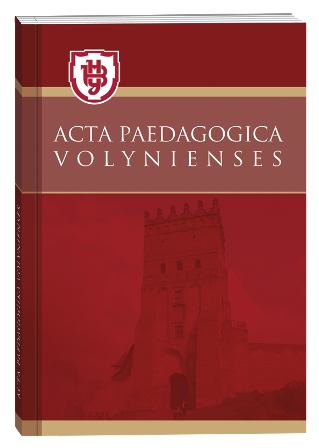THE RELATIONSHIP BETWEEN FOREIGN LANGUAGE COMPETENCE AND INTERCULTURAL COMMUNICATION IN THE TRAINING OF FUTURE PHILOLOGISTS IN POLISH STUDIES
DOI:
https://doi.org/10.32782/apv/2025.3.17Keywords:
foreign language competence, intercultural communication, philological education, future philologist in Polish studies, translation practice, professional training, project-based activityAbstract
The article explores the relationship between foreign language competence and the ability for intercultural communication within the framework of training future philologists specializing in Polish studies. It emphasizes that foreign language competence is a multi-component construct encompassing speech skills, cognitive knowledge, sociocultural awareness, and professionally oriented abilities. It serves not only as a tool for effective communication but also as a vital factor in professional self-realization in a globalized environment. Successful acquisition of Polish as a foreign language requires more than formal knowledge of grammar and vocabulary; it also demands an understanding of the mental, cultural, and behavioral models of another society. Intercultural communication is viewed as the ability to engage in productive interaction with representatives of other cultures based on empathy, openness, flexible thinking, and critical reflection on one’s own cultural identity. The article analyzes modern pedagogical strategies for developing these competencies, including translation practice, work with authentic materials, and interactive learning methods (role plays, case studies, discussions), along with student participation in interdisciplinary and international projects. Examples of successful educational practices at the Department of Slavic Philology of Khmelnytskyi National University are presented, such as the "Translator's Code" project, international cooperation with educational institutions in Poland and the Czech Republic, and student involvement in the creation of an interactive dictionary of Polish key words. These initiatives provide deep immersion in real intercultural environments and contribute to the development of linguistic sensitivity, communicative flexibility, and critical thinking. The study substantiates that only a holistic, integrated, interdisciplinary approach to philological education can foster a modern specialist capable of effective performance in a multilingual and multicultural world.
References
Гутиряк, О. (2022). Міжкультурна комунікація: до визначення поняття. Актуальні проблеми гуманітарних і природничих наук. Випуск 47 (2), 205–208
Дроздова, В., Рудніцька, К. (2021). Структура професійної іншомовної компетентності майбутнього фахівця. Науковий вісник Ужгородського університету. Серія : «Педагогіка. Соціальна робота». Випуск № 2 (49), 51–55.
Захист виробничої перекладацької практики здобувачами освіти за ОПП «Філологія. Польська мова та література, друга мова – англійська». 2025 : веб-сайт. URL : https://ksf.khmnu.edu.ua/zahyst-vyrobnychoyi-perekladaczkoyi-praktyky-zdobuvachamy-osvity-za-opp-filologiya-polska-mova-ta-literatura-druga-mova-anglijska/ (дата звернення 5.06.2025).
Захист навчальної (перекладацької) практики студентами-полоністами 1 курсу. 2024: веб-сайт. URL : https://ksf.khmnu.edu.ua/zahyst-navchalnoyi-perekladaczkoyi-praktyky-studentamy-polonistamy-1-kursu-2/ (дата звернення 4.06.2025).
Когут, І. (2022). Формування іншомовної компетентності у студентів в процесі навчання: теоретичні засади. Молодий вчений. Випуск 10 (110), 106–110.
«Кодекс перекладача» – студентський проєкт, що змінює погляд на переклад. 2025: веб-сайт. URL : https://ksf.khmnu.edu.ua/kodeks-perekladacha-studentskyj-proyekt-shho-zminyuye-poglyad-na-pereklad/ (дата звернення 9.06.2025).
Кухта, І. (2008). Іншомовна компетентність у контексті формування комунікативної культури студентів у процесі вивчення іноземної мови: веб-сайт. URL : http://conf.vntu.edu.ua/humed/2008/txt/Kuchta.php (дата звер- нення 29.05.2025).
Манакін, В. (2012). Мова і міжкультурна комунікація : навч. посібник для університетів. Київ : Академія, 2012. 285 с.
Мовна практика в Польщі: досвід здобувачок Хмельницького національного університету з BIOPHARMA PLASMA LLC. 2025 : веб-сайт. URL : https://ksf.khmnu.edu.ua/movna-praktyka-v-polshhi-dosvid-zdobuvachok-hmelnyczkogo-naczionalnogo-universytetu-z-biopharma-plasma-llc/ (ДАТА ЗВЕРНЕННЯ 9.06.2025).
М’язова, І. (2008). Міжкультурна комунікація: зміст, сутність та особливості прояву (соціально-філософський аналіз) : автореф. дис. … канд. філос. наук. Київ, 2008. 21 с.
Печенікова, Л. (2016). Стратегії міжкультурної комунікації в мовній освіті сучасного ВНЗ. Збірник матеріалів міжнародної науково-практичної конференції. Київ, 2016, 106–108.
Подлевська, Н. (2022). Фахова підготовка майбутніх філологів-полоністів у процесі вивчення дисципліни «Вступ до слов’янської філології». Наукові записки. Серія : Педагогічні науки. Кропивницький: РВВ ЦДПУ ім. В. Винниченка. Випуск 205, 156–162.
Полоністи – учасники польсько-німецько-українського орнітологічного проєкту «Птахи навколо нас». 2025 : веб-сайт. URL : https://ksf.khmnu.edu.ua/.../ptahy-navkolo-nas-v-ramkah-triyou (дата звернення 25.05.2025).
Реалізація проєкту «Study of common ornithological species of Ukraine, Poland and Czech Republic». 2024 : веб-сайт. URL : https://ksf.khmnu.edu.ua/.../realizacziya-proyektu (дата звернення 6.06.2025).
Сарновська, Н. (2019). Проєктна діяльність як мотивуючий фактор у формуванні іншомовної комунікативної компетентності майбутніх фахівців. ΛΌΓOΣ. Мистецтво наукової думки. Випуск 2, 37–39.
Участь викладача і студентів кафедри слов’янської філології у Конкурсі інноваційних ідей молодих вчених. 2024: веб-сайт. URL : https://ksf.khmnu.edu.ua/uchast-vykladacha-kafedry-slovyanskoyi-filologiyi-svitlany-vojtalyuk-u-konkursi-innovaczijnyh-idej-molodyh-vchenyh/ (дата звернення 1.06.2025).
Черненко, О. (2023). Інтерактивні методи навчання як дидактичний підхід до розвитку проєктної культури у майбутніх викладачів. Наукові записки. Серія : Педагогічні науки. Випуск 215. 277–285.
Чиханцова, О. (2019). Іншомовна комунікативна компетентність як фактор розвитку особистості : веб-сайт. URL : https://lib.iitta.gov.ua/id/eprint/718913/2/%D0%A7%D0%B8%D1%85%D0%B0%D0%BD%D1%86%D0%BE%D0%B2%D0%B0.pdf?utm_source=chatgpt.com (дата звернення 20.05.2025).
Bartmiński, J. (2008). Nauka o języku w podstawie programowej. Język polski w szkole podstawowej, gimnazjum i liceum. Warszawa, 2008, 60–63.
Hall, E. (1976). Beyond Culture. Garden City, NY: Anchor Press/Doubleday. 256.
Zawadzka, E. (2004). Nauczyciele języków obcych w dobie przemian. Kraków, 2004. 344.








